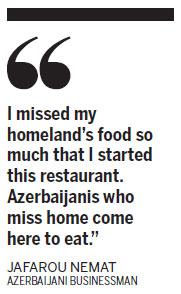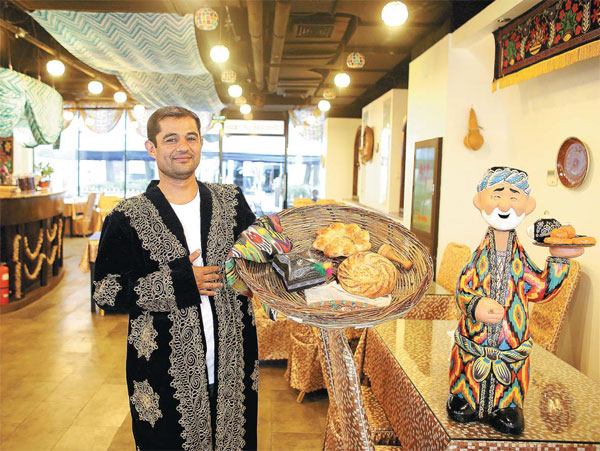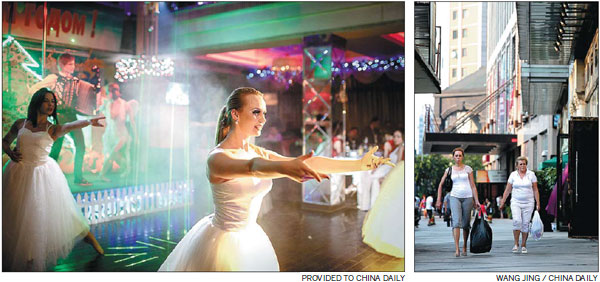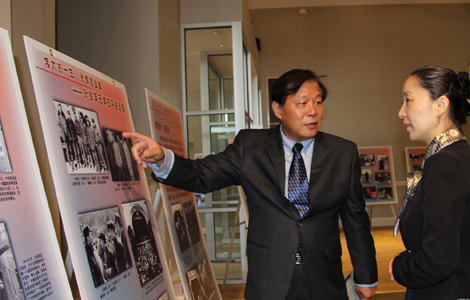'Beijing-Istan' taking shape
Updated: 2014-08-23 07:29
By Erik Nilsson(China Daily)
|
||||||||
Yabaolu residents expect influx of people from 'New Silk Road' countries

The Soviet Union is reuniting - in a sense - in Beijing. More precisely, the people of the countries of the former Soviet bloc are expanding their presence in what's commonly referred to as "Russiatown" in the Chinese capital.
Few outsiders realize the moniker is something of a misnomer.
There are Russian crowds in the neighborhood, where signs are in Cyrillic and most Chinese speak Russian. But few Russians actually live there.
Most are traders who visit the Yabaolu fur market to buy fur wholesale and resell it back home. Their numbers are declining, though, because of the changing Russian commercial dynamics triggered by sanctions, Customs crackdowns and the global economic slowdown.

|
Uzbek restaurant Minaret's owner Dilshodbek Bakiev is confident about the future of Yabaolu. Wang Jing / China Daily |
|
From left: It's show time at the Mango, one of several Russian restaurants in Yabaolu; The fur market in Yabaolu is receiving fewer customers. |
That said, many who actually live in the neighborhood hail from other Soviet states. And their numbers are growing, residents say.
So, "Russiatown" is essentially turning into "Beijing-istan".
"I've met fewer Russians than people from the 'stan' countries," says 22-year-old Alyona Kachalova, a Crimean who works as an assistant to the owner of Yabaolu's only two Russian-owned restaurants, Dacha and Chocolate.
The presence of people from other Soviet republics is becoming more conspicuous as eateries serving cuisines from Kazakhstan, Uzbekistan, Georgia and Azerbaijan behind the fur market have roughly tripled to about half a dozen in the past year. There were none in the area two years ago.
"Yabaolu is more of a Russian-speaking area, not a Russian area," says Kachalova.
And residents anticipate an influx from countries along the "New Silk Road Economic Belt" proposed by President Xi Jinping that's expected to encompass more than 40 Asian and European countries - including the entire former USSR - which are home to about 3 billion people.
"This will be good for business," says 34-year-old Azerbaijani Asim Alishov, who opened Caspi restaurant on the pedestrian street two months ago.
"The more people who come here, especially from Soviet countries, the better for us."
Alishov, who worked in logistics, lived in Yabaolu for 12 years before deciding to open his restaurant, since the local export business is shrinking.

He points out that Azerbaijani fare is, for historical reasons, much loved among Soviet countries, although its global acclaim has been eclipsed by Turkish food - a similar yet distinct cuisine - outside the former USSR.
Jafarou Nemat, 34, who owns the nearby Azerbaijani, Russian and Georgian restaurant Kavkaz, says: "A growing number of people know this area has Soviet style, even though the countries all have unique cultures. In the coming years, this area will have 100 eateries. It will be like Sanlitun (Beijing's embassy area) but for Soviets."
Uzbek Dilshodbek Bakiev is also hopeful about the prospects of more people from Soviet republics coming to Yabaolu.
The 35-year-old believes the New Silk Road Economic Belt will mean more Central Asians will come to Yabaolu and his restaurant. He was excited his country's president visited China this month.
"It's business. China wants to sell. Foreigners want to buy," he says. "As the trade volume (grows), more foreigners will move (to Yabaolu)."
He says he doesn't worry about whether that might mean more competition for his Uzbek diner Minaret, which opened two months ago next to what's billed as Beijing's only Kazakh eatery, Astana.
"I'd love it because we'll be able to show more Chinese our food," Bakiev says.
He likens Yabaolu to compote, a Central Asian drink his restaurant makes.
"Compote is made of mixing different fruits boiled in water. This area is made of many different (Soviet countries') restaurants. It's like a melting pot."
Inside his diner, Kyrgyzstani Juliyafs Maia is dining with two compatriots, both of whom have Chinese husbands.
"We come here once or twice a week," the 41-year-old says between vodka shots.
"The Central Asian food here is very good. Yabaolu is a special place because there are so many people from the former Soviet Union. And the Chinese here can speak Russian. That's very important ... I can't speak Chinese."
Alishov has witnessed the neighborhood's transformations during his time there and expects change to continue.
"This place was just hutong (traditional Chinese courtyards) when I first arrived in 2002," he says.
"There were little shops selling fur. All the buildings were small. Now, there are big buildings. After 2008, restaurants started opening because of demand. Visitors wanted Soviet countries' food. Demand has since grown."
Alishov and Nemat both worked in logistics, shipping goods from Yabaolu's market and other locations in China to Russia and Ukraine, before opening diners.
"The (fur) market is bigger and better. But the buyers are becoming fewer," Nemat says.
"Business isn't as good. It's getting harder."
But his restaurant has withstood the changes.
Nemat says he ate out every day when he was working in Yabaolu.
"The food was expensive but not so good," he says.
And only Russian or Chinese food was available.
"I missed my homeland's food so much that I started this restaurant. Azerbaijanis who miss home come here to eat."
About 60 percent of customers come from Soviet countries - especially Azerbaijan - while 25 percent are Chinese and others are from other countries, particularly the Middle East.
Kavkaz takes its name and cuisine from the eponymous region that includes southern Russia, Azerbaijan and Georgia. It recently renovated to feature more prominently regional elements in its decor.
Alishov cites similar motivations for transitioning from logistics to running an Azerbaijani restaurant.
"The food we wanted wasn't in Beijing. We saw the demand was high here and opened Caspi," he says.
The eatery's name comes from the Caspian Sea, the image of which is featured on the eatery's sign alongside architectural landmarks from the country's capital, Baku. Inside, artwork shows Azerbaijani buildings blending into the Great Wall above and the two countries' flags blurring into each other below.
Similarly, Minaret's sign is emblazoned with the Uzbek flag, while folk items adorn the walls, and a statue of a man in traditional clothes greets visitors at the door.
Nemat, who has also lived in Moscow, calls Yabaolu his "third home".
"Those of us who've stayed here for a long time feel like, yeah, there is less business," he says.
"But we love it here even more."
Contact the writer at erik_nilsson@chinadaily.com.cn.
(China Daily 08/23/2014 page15)
Most Viewed
Editor's Picks

|

|

|

|

|

|
Today's Top News
China urges US to stop close-in surveillance
US seeks multi-prong strategy against ISIL forces
SpaceX test rocket crashes in Texas
The 'house-as-an-ATM' experiment
Investment laws revised by next year
Maine woman convicted of embezzling from Chinese
Icy challenge is bringing the 'circus' to town
In reforms, China will never 'copy' others: Xi
US Weekly

|

|

















